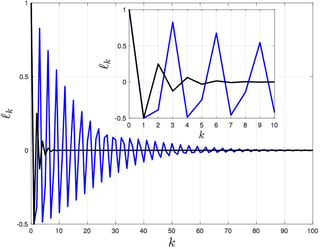Question
Let $(X_n)_{n\in \mathbb{N}}$ be an irreducible Discrete Time Markov Chain (DTMC) with finite state space $S$, transition matrix $P$ and steady state $\pi$. Assume that we are ''far enough'' in time that we may assume that for all $n$ $X_n \overset{d}{=} \pi$ then we define: $$ \ell_m := \mbox{Corr}(X_{n}, X_{n+m}), $$ since we are working with a Markov chain one would think that for all $m$, $\ell_m$ can be expressed in function of $\ell_1$. My question is : Is there a good way to see this and what this relation is? i.e. find for each $m$ the function $f_m$ s.t. $\ell_m = f_m(\ell_1)$. As show below, for the special case $|S| = 2$ the function $f_m$ is just given by $f_m(x) := x^m$.
Special Case
In a very special case : a state space with only 2 states we have with $\pi = [\alpha\quad 1-\alpha]$ that for some constant $a \in \left[\max\left(2-\frac{1}{\alpha},0\right),1\right]$: $$ P = \begin{pmatrix} a & 1-a\\ \frac{\alpha-\alpha a}{1-\alpha} & \frac{\alpha a - 2\alpha + 1}{1-\alpha}. \end{pmatrix} $$ This allows one to see (by trivial calculations) that $\ell_1 = \mbox{Det}(P)$. But then we see, as $\ell_m$ is just $\ell_1$ for the adapted process $Y_n := X_{n\cdot m}$: $$ \ell_m = \mbox{Det}(P^m) = \mbox{Det}(P)^m = \ell_1^m $$

